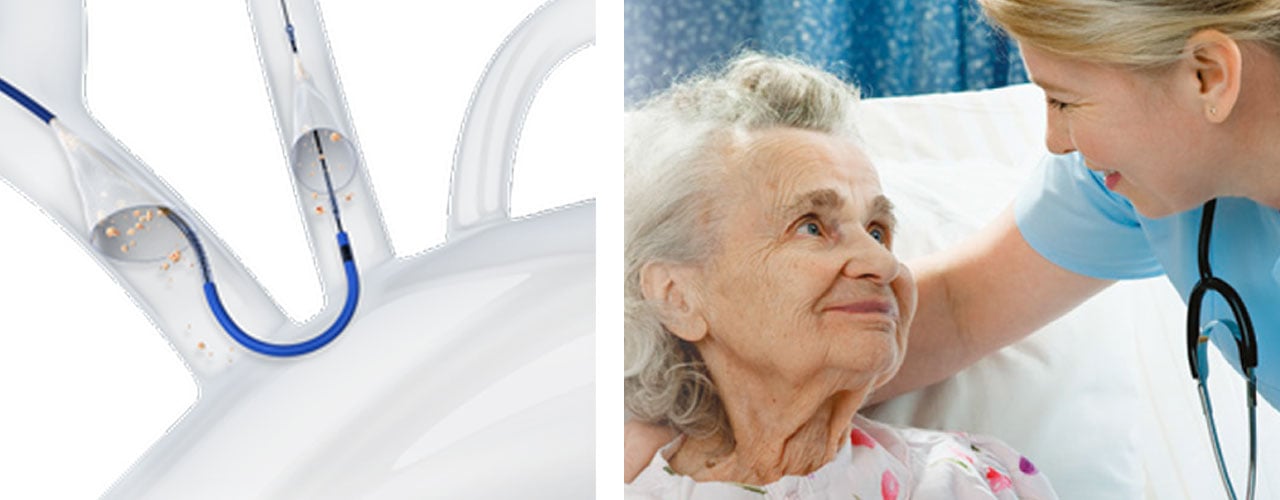BHF PROTECT TAVI is a 6-year research study, based in the UK which began in June 2020. The study aims to recruit 7730 participants who are undergoing Transcatheter Aortic Valve Implantation (TAVI) for aortic stenosis. The aim of the research is to understand whether the use of cerebral embolic protection devices during TAVI procedures impacts the risk of stroke. This will be evaluated using a randomised controlled trial study design.
About the study
Aortic stenosis (AS) is a common life-threatening condition, where blood flow out of the heart is restricted by narrowing of the aortic valve. There are two ways to treat AS. Transcatheter Aortic Valve Implantation (TAVI) inserts a new valve inside the existing diseased valve. Surgical aortic valve replacement (AVR) involves surgery on the heart to replace the diseased valve. TAVI is less invasive than surgical AVR. However, there are still risks with TAVI, including stroke and death. Stroke in TAVI can be caused by debris released into the bloodstream by the procedure. Devices, called cerebral embolic protection (CEP), have been developed that capture some of this debris using filters temporarily placed in the artery which provides blood to the brain. However, there is of yet no evidence that shows that CEP meaningfully reduces stroke in TAVI patients. This trial will address this evidence gap. In this study we will randomly assign patients receiving TAVI to receive CEP during TAVI or to the current standard of care without CEP. Potential participants will be approached prior to their TAVI procedure to discuss the trial. If they are happy to take part, full informed consent will be sought. Following the TAVI, we will assess whether participants have a stroke in the following 72 hours. We will also assess other ways the CEP treatment impacts on the NHS as well following-up participants for 12 months to assess their long-term outcomes. We will recruit 7730 participants across the UK over 6 years.
Eligibility criteria
The target population for this trial is patients with severe aortic stenosis undergoing treatment by TAVI.
Inclusion criteria
- Participant is willing and able to give informed consent for participation in the trial
- Aged 18 years or above
- Considered to be candidates for TAVI by the clinical team (via any access route where CEP may be used)
- Participant is suitable for treatment with the cerebral embolic protection device in the opinion of the treating physician
PROTECT-TAVI is a collaboration between University of Oxford and London School of Hygiene & Tropical Medicine.
Rajesh Kharbanda
Professor / Chief Investigator
James Kennedy
Richard Evans
Senior Manager of the Clinical Trials Unit
Alexander Perkins
Senior Trial Manager
Steven Robertson
Senior Data Manager
Laura Van Dyck
Data Manager
Zahra Jamal
Trial Assistant
Kiran Bal
Assistant Trial Manager
BHF PROTECT-TAVI trial protocol
View the BHF PROTECT-TAVI trial protocol.
BHF PROTECT-TAVI participant information sheet
Read the BHF PROTECT-TAVI participant information sheet.
BHF PROTECT-TAVI consent form
Download the BHF PROTECT-TAVI consent form.
BHF PROTECT-TAVI animation
You can also find out more about the trial by watching our animated patient information video.
The animation is available in 5 languages (English, Bengali, Polish, Hindi and Turkish) and can be accessed using the link below.
- Randomisation System
-
Please check back later for content.
- eCRF
-
Please check back later for content.
Read the Sentinel Quick Reference Guide. Users are required to create an account to access the Educare platform.
Please see below for our e-bulletins.
- 2024
- 2023
- 2022
- 2021
Total number of participants randomised:
6388 (Updated 05/04/2024)
| Site name | No. randomised 01/04/24 - 05/04/24 | Total no. randomised | Average no. randomised per month |
|---|---|---|---|
| Aberdeen Royal Infirmary | 1 | 54 | 3 |
| Basildon University Hospital | 1 | 202 | 6 |
| Blackpool Victoria Hospital | 0 | 51 | 2 |
| Bristol Heart Institute | 0 | 125 | 4 |
| Castle Hill Hospital, Hull | 3 | 91 | 3 |
| Derriford Hospital, Plymouth | 0 | 66 | 3 |
| Freeman Hospital, Newcastle | 0 | 181 | 7 |
| Glenfield Hospital, Leicester | 0 | 8 | 3 |
| Golden Jubilee Hospital, Clydebank | 1 | 180 | 5 |
| Hammersmith Hospital, London | 0 | 52 | 3 |
| James Cook University Hospital, Middlesbrough | 2 | 167 | 8 |
| John Radcliffe Hospital, Oxford | 5 | 790 | 18 |
| King's College Hospital, London | 1 | 223 | 5 |
| Leeds General Infirmary | 6 | 937 | 23 |
| Liverpool Heart and Chest Hospital | 1 | 467 | 13 |
| Morriston Hospital, Swansea | 0 | 33 | 1 |
| New Cross Hospital, Wolverhampton | 0 | 376 | 9 |
| Northern General Hospital, Sheffield | 0 | 70 | 4 |
| Nottingham Hospital | 0 | 124 | 4 |
| Queen Elizabeth Hospital, Birmingham | 5 | 153 | 7 |
| Royal Infirmary of Edinburgh | 0 | 72 | 2 |
| Royal Papworth Hospital, Cambridge | 0 | 54 | 2 |
| Royal Stoke University Hospital | 0 | 77 | 5 |
| Royal Sussex County Hospital, Brighton | 1 | 638 | 16 |
| Royal Victoria Hospital, Belfast | 0 | 102 | 3 |
| Southampton General Hospital | 3 | 260 | 8 |
| St Bartholomew's Hospital, London | 1 | 299 | 8 |
| St George's Hospital, London | 0 | 122 | 4 |
| St Thomas' Hospital, London | 0 | 93 | 3 |
| University Hospital Coventry | 1 | 51 | 4 |
| University Hospital of Wales, Cardiff | 5 | 151 | 4 |
| Wythenshawe Hospital/Manchester Royal Infirmary | 0 | 119 | 4 |




